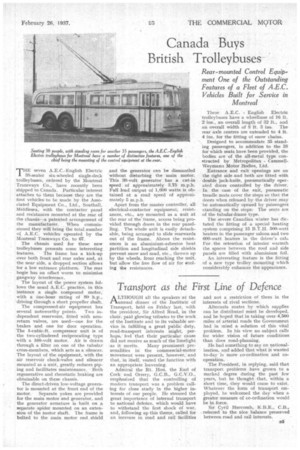Transport as the First Line of Defence A LTHOUGH all the
Page 39

If you've noticed an error in this article please click here to report it so we can fix it.
speakers at the annual dinner of the Institute Of Transport, held on Friday last, with the president, Sir Alfred Read, in the chair, paid glowing tributes to the work of the Institnte and to its valuable service in fulfilling a great public duty, road-transport interests might, perhaps,feel that their particular cause did not receive as much of the limelight -as it merits. Many prominent personalities inthe commercial-motor movement were present, however, and that, in itself, vested the function with an appropriate leavening.
Admiral the Rt. Horl. the Earl of Cork and Orrery, •G.C.B., G.C.V:O., emphasized that the controlling of modern transport was a problem calling for close study in the higher interests of our people. He stressed the great importance of internal transport to national defence, which would have to withstand the first shock of war, and, following up this theme, called for an increase in road and rail facilities and not a restriction of them in the interests of rival sections.
Alternate routes by which supplies can be distributed must be developed, and he hoped tlaatin taking over 4,500 miles of arterial roads the Government had in mind a solution of this vital problem. In his view no subject calls for wider vision of future conditions than does road-planning.
He had something to say on nationalization, and added that what is wanted to-day 'is more co-ordination and cooperation. .
The President, in replying, said that transport problems have grown to a marked degree during the past few years, but he thought that, within a short time, they would cease to exist. Whatever the form of transport employed, he welcomed the day when a greater measure of co-ordination would be in force.
Sir Cyril Hurcomb, .B.E., C.B., referred to the nice balance preserved between road and rail interests. .




























































































